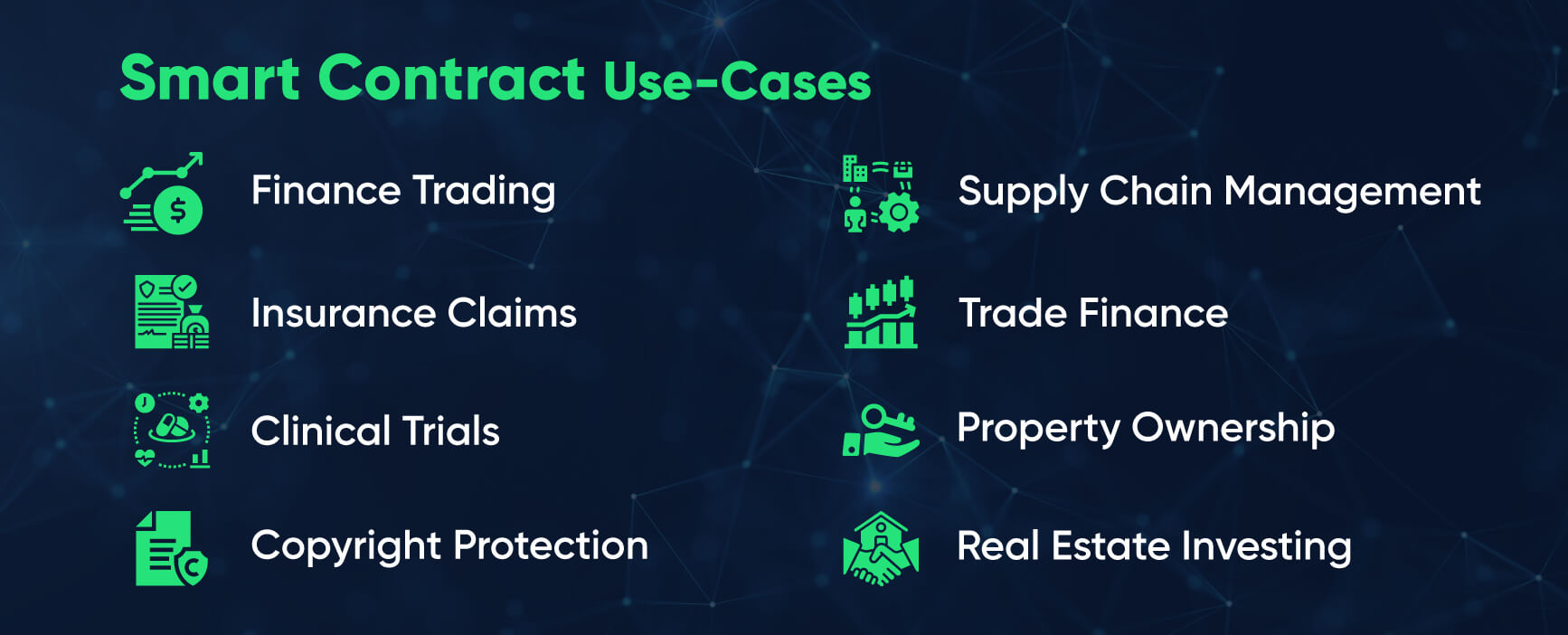
Introduction
Blockchain & Web3 Services Trusted By Leaders
- Develop innovative solutions using our state-of-the-art blockchain expertise.
- Achieve accelerated growth with robust & scalable Web3 consulting.
- Unlock 360-degree security with our top-rated blockchain development.
What are the world’s top 12 smart contract use cases?
Businesses can integrate smart contracts to transform anything that relies on digital authentication, including banks’ internal processes, warehouses’ inventory management, and healthcare providers’ patient records. This article aims to explain smart contract use cases. For a better understanding, we broke it down into three parts:A. Common smart contract use cases
B. Use-cases followed by business-to-business
C. Industry-specific use cases

A. Common smart contract use cases
1. Defi
On Defi platforms, smart contracts enable sophisticated transactions such as lending, borrowing, and derivatives. Smart contracts on Defi platforms boost the quality of services and significantly reduce costs.
2. NFT
NFT trading is one of the most impactful uses of smart contracts. Smart contracts enable non-fungible tokens (NFTs) by allocating ownership and managing transferability. These contracts can also include royalty payments and software access rights.
B. Smart Contract Use Cases Followed By B2B
3. Copyright management
There is no doubt that the Internet is the golden age of content, but it has also been called the dark age of copyright. It has become increasingly difficult for artists to receive their due acknowledgment and compensation when third parties sell their creative work. Royalty payments can be simplified and facilitated by smart contracts. A blockchain can record ownership and other aspects of digital copyright assets. As a result, smart contracts can enable artists or content creators to receive a percentage of NFT sales if they mint their NFTs.
4. Data Marketplaces
Smart contracts bring up many new possibilities for data trading. These innovative data marketplaces allow users to team up and buy real-time data streams. Moreover, as a result of eliminating the middleman by using smart contracts, these buyers’ ownership costs are less high.
5. Financial Data Recording
By implementing smart contract solutions, organizations in the global supply chain can enjoy accurate and transparent data recording while improving speed and security. Adopting a new method of transaction settlements in the logistics industry, smart contracts will save businesses billions on inaccuracies, fraud, and wasted time.
C. Industry-Specific Smart Contract Use Cases
1. Gaming
6. Play-to-earn model
Play-to-Earn (P2E) games are gaining traction. Smart contracts make big gamers feel secure while trading and doing p2p transactions in games. These digital contracts enable players to do everyday transactions such as securely buying and selling in-game items and game-specific actions such as guns for loot, breeding characters, etc. For example, Axie Infinity is a game that uses NFT smart contracts to sell lands and claim rewards. As a result, transparency and authenticity are enhanced with the gaming experience through smart contract integration.
2. Healthcare
7. Clinical Trials
The healthcare industry relies heavily on data management and prevention. Blockchain technology can streamline patient data and payments for hospitals and researchers. This blockchain solution combines patient data with payment data to facilitate access to data, payments, and records of individuals.
8. Insurance
Smart contracts can improve insurance processes by automating claims management & data collection. Insurance companies can integrate smart contracts to deal with delayed insurance claims. As a result, smart contract development and integration in the insurance business can automatically trigger delayed payment. Moreover, smart contracts are immutable and transparent, and no one can alter them; insurance companies will save money on manual labor costs.
3. Logistics
9. Supply Chain Management
In a supply chain, transactions don’t occur only between the buyer and the seller. Instead, multiple parties are involved, such as manufacturers, wholesalers, suppliers, and distributors. In traditional supply chains, each party has to verify the accuracy of their ledger with others manually. This process would take more time to complete. But smart contracts can automate those tasks, which makes it much faster and easier for participants in the supply chain to reach a consensus quickly when discrepancies occur.
10. International Trade Finance
Currently, it has proven to be highly complicated for SMEs to gain access to financing from banks and other traditional sources. In addition, smart contracts have gained popularity recently in the finance and insurance industries as blockchain technology has become more mainstream.
4. Real Estate
11. Property Ownership
The traditional way to change property ownership is to go through the legal process. It takes time for buyers, sellers, and government officials to document changes. Property ownership changes can be sped up with smart contracts. The smart contract can change asset ownership automatically when the buyer pays the seller.
12. Real Estate Investing
Tokenized real estate provides a way to earn passive income through dividends or rental income. Blockchain technology and smart contracts are ideally suited for ownership tokenizing physical assets. Blockchain technology may be able to substantially simplify the process of selling shares in a real estate fund. Tokenized shares in a real estate fund (REIT) can be bought and traded on secondary exchanges (token exchanges). Real estate investment revenue is distributed proportionately to token holders. Using smart contracts would eliminate the need for real estate agents to collect and distribute funds from their properties.